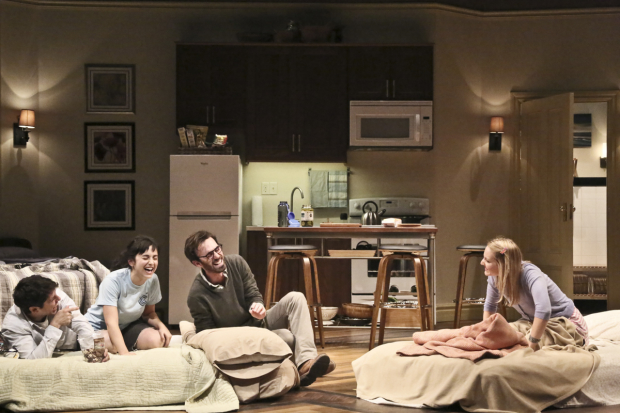Bad Jews

(© Michael Lamont)
Whether the players in Joshua Harmon's Bad Jews are "bad" or otherwise, director Matt Shakman's production for the Geffen Playhouse makes for 90 minutes of intelligent and nasty fun. Performers Ari Brand, Molly Ephraim, Lili Fuller, and Raviv Ullman deftly unravel a tale about the value — and price — of maintaining cultural traditions, a tale that comes with an unexpected hook amid all of the play's comic rants. Give a special tip of the hat to Ephraim for going the full-gusto route to portray as hateful a character as the stage has disgorged in recent memory.
"Bad Jews" opens in the hours following Poppy's funeral. Liam (the eldest of his grandchildren and the first male) was a no-show due to an alleged mishap involving a lost cell phone on the slopes of Aspen. Daphna has clashed with Liam in the past, and she's not buying any excuses given her cousin's history of self-centered and anti-Semitic behavior.
They're anti-Semitic to Daphna, a militant Jew who pushes her values and beliefs on anyone and everyone. Her contempt for the largely unobservant Liam is so deep that a knock-down drag-out between the cousins seems inevitable. Complicating matters further, Daphna and Liam are both laying claim to the gold chai that belonged to their grandfather, a relic that Poppy kept under his tongue during the Holocaust. Jonah doesn't want it. Wisely, he does not want to get involved in any feud between his brother and his cousin.
When Liam finally does arrive, he brings his gentile girlfriend Melody (Fuller) who figures into Liam's plans for the chai. Melody is gentle and diplomatic to a fault, but she's not terribly bright, making her fresh meat for Daphna's attacks. Given the stakes, things will get ugly, and then cathartic.
Ephraim, Ullman and Brand establish a credible family rapport; clearly they are same-age family members who maintain shared bonds now that they are in their '20s. Whatever bitterness over past events may linger in the air between them, the trio can cast them aside to flop across the mattresses on the floor (John Arnone's smartly designed set hits the mark) and cackle over a family memory.
Melody loves hearing it; she does not consider herself the outsider. A peacekeeper who defaults to kindness, Melody even accedes when Daphna requests a song to help calm her nerves. Her choice of musical sedative, however, is comically unwise. Fuller's delivery of this song represents the hilarious apex of a very funny play. That the actress manages to get the tune out and keep a straight face amid an audience dissolving in hysterics is a feat indeed.
Harmon peppers "Bad Jews" with angry sweeping monologue-y rants, the majority of which are delivered by Daphna. Her voice by turns rising, falling and filling up with irony and sarcasm, Ephraim is a showcase of comic neuroses and bile. The character is close to being a sketch, and with every manic brush of her hair or clench of a jar of pickles, Ephraim works to bring her back from the edge of all-out schtick-ery. Viewed as a study of neuroses and deep insecurity, Ephraim's is a dangerous and occasionally fascinating performance. Brand's Liam offers a nice counterpoint. He too is tic-riddled and prone to angry outbursts. Brand leaves us nicely uncertain whether Liam is more culturally connected that Daphna gives him credit for, or just a shallow opportunist. Ullman does solid work as Jonah, the play's hectored and quiet onlooker.
Once the dust settles and just before the curtain comes down, Bad Jews has a final thoughtful card up its sleeve. Regardless of whether you see it coming, or whether you think Harmon is playing fair, that last revelation should generate some intriguing post-show discussion. Bad Jews is poised to be one of the most oft-produced plays in America, and Shakman's production more than shows its merit. In the case of the play's conflicted Feygenbaum/Haber clan, "Bad" is good indeed.










